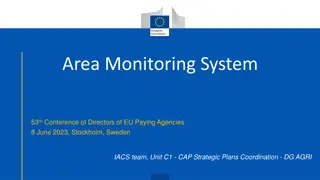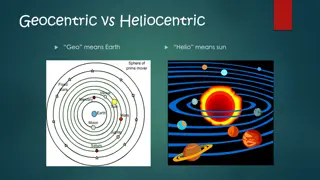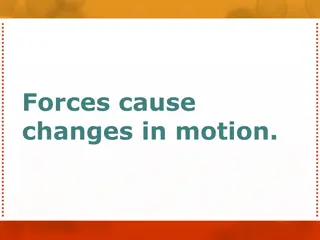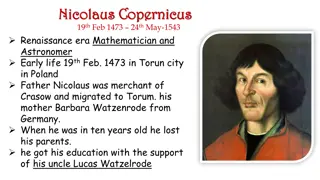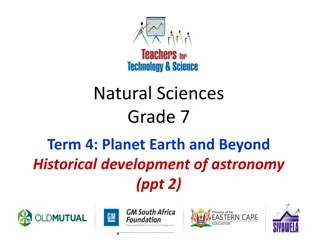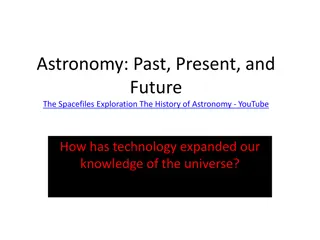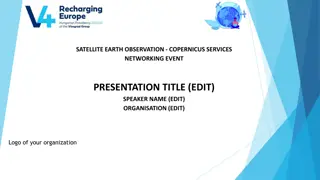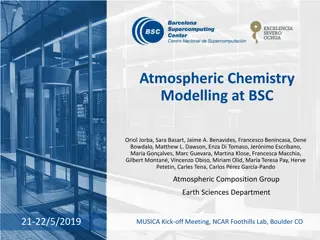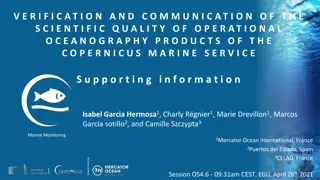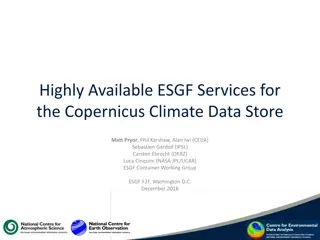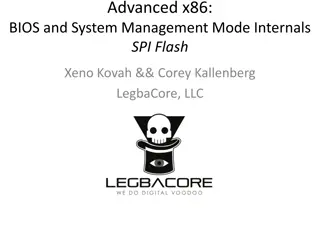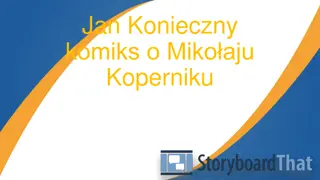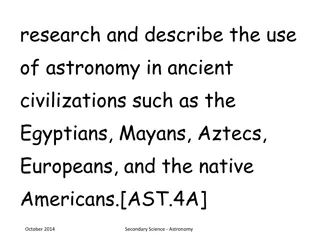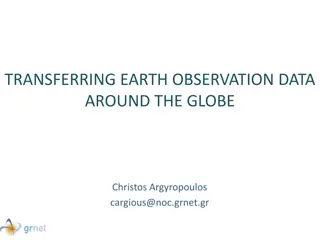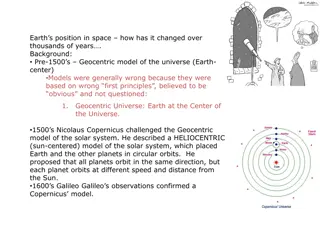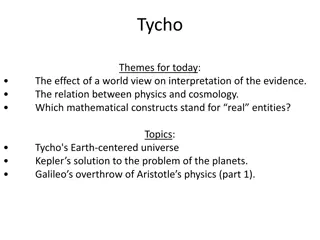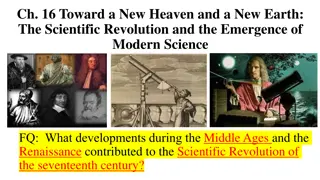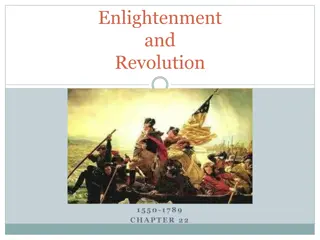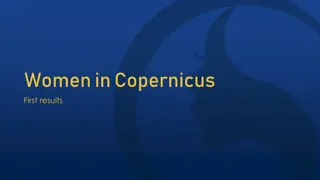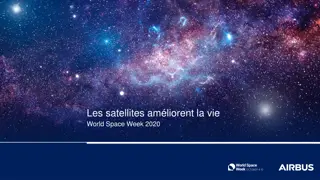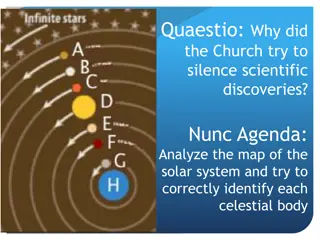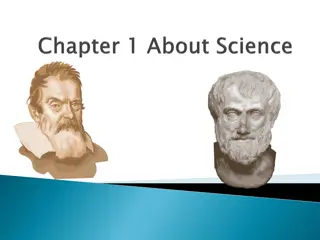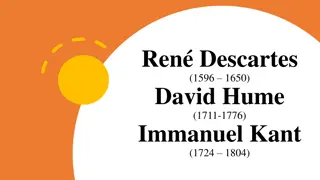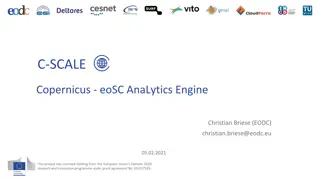Comprehensive Overview of Area Monitoring System Implementation in EU Paying Agencies
The Area Monitoring System (AMS) plays a vital role in assessing agricultural activities in Member States. This system ensures exhaustive coverage, automated processing, and mandatory monitoring of eligibility conditions for area-based interventions. AMS utilizes Copernicus Sentinels satellite data
2 views • 27 slides
Evolution of Cosmic Understanding: From Flat Earth to Heliocentrism
Over millennia, human perception of the universe has transformed from viewing the sky as a dome above a flat Earth to accepting the heliocentric model proposed by Copernicus. Ancient beliefs, such as the Hebrew view of the universe, gave way to Greek philosophers' spherical Earth theory and the even
7 views • 67 slides
The Revolution of the Solar System: Geocentric vs Heliocentric Theories
The geocentric theory placed Earth at the center of the universe, with all planets revolving around it, while the heliocentric theory proposed the Sun as the central body. Influential figures like Aristotle, Ptolemy, and Copernicus greatly impacted the understanding of our solar system, leading to p
1 views • 12 slides
Understanding Forces in Motion Throughout History
Forces play a crucial role in causing changes in motion, as observed through the perspectives of Aristotle on natural and violent motion, the beliefs about Earth's rest, and Copernicus challenging the geocentric view with a heliocentric model. The concept of forces driving motion has evolved over ce
1 views • 27 slides
Nicolaus Copernicus: Renaissance Astronomer and Mathematician
Nicolaus Copernicus, born on 19th Feb 1473 in Torun, Poland, was a key figure in the Renaissance era. He proposed the revolutionary Heliocentric Theory and argued that the planets revolved around the Sun. His major work, "On the Revolutions of Heavenly Spheres," challenged the geocentric view of the
0 views • 23 slides
Historical Development of Astronomy in Grade 7 Natural Sciences
Explore the historical development of astronomy with renowned figures like Nicolaus Copernicus, Galileo Galilei, and Johannes Kepler. Discover key advancements in our understanding of the solar system and beyond, including the heliocentric model, telescopic observations, and planetary movement laws.
0 views • 10 slides
Evolution of Astronomy: From Ancient Civilizations to Modern Discoveries
Explore the history of astronomy from ancient Egyptian beliefs in Ra to the groundbreaking theories of Copernicus and Galileo. Witness how technology has revolutionized our understanding of the universe, leading to discoveries such as the heliocentric model and Kepler's laws of planetary motion.
0 views • 25 slides
Satellite Earth Observation for Copernicus Services - Networking Event Presentation
Explore the potential of satellite earth observation within the Copernicus Services networking event. Customize your presentation with expert insights, project ideas, and consortium contributions. Share your expertise and contact details for a collaborative future in Horizon Europe initiatives.
0 views • 7 slides
Cutting-Edge Atmospheric Chemistry Modeling Research at Barcelona Supercomputing Center
Conducted by the Atmospheric Composition Group at Barcelona Supercomputing Center, this cutting-edge research focuses on atmospheric chemistry modeling using advanced tools and frameworks like HERMESv3 and MONARCH. The team's approach integrates various modules to study complex processes influencing
0 views • 16 slides
Marine Monitoring: Verification and Communication of Scientific Quality in Operational Oceanography Products
Marine Monitoring - Verification and communication of the scientific quality of operational oceanography products of the Copernicus Marine Service, focusing on the evaluation, documentation, and improvement of the quality information provided to users. Challenges in uncertainty estimates and forecas
0 views • 13 slides
Highly Available ESGF Services for the Copernicus Climate Data Store
The Copernicus Climate Data Store (CDS) is a crucial component of the Copernicus Climate Change Service (C3S) operated by ECMWF for the European Union. It offers a unified interface for climate-related data and supports various sectors with key climate change indicators. To ensure the availability o
0 views • 16 slides
Understanding BIOS Flash and System Management Mode Internals
Dive into the intricacies of BIOS flash and system management mode internals, exploring SPI flash technology, attacker persistence strategies, Copernicus vulnerability scanning results, BIOS flash locations, and boot BIOS flash configurations. Uncover the significance of hardware pins in determining
0 views • 28 slides
Jan Konieczny's Comic about Copernicus
In this comic by Jan Konieczny, the story of Copernicus unfolds in a visually engaging manner. Get ready to delve into the world of astronomy and history through captivating illustrations.
0 views • 8 slides
Ancient Astronomy and Modern Contributions
Explore the use of astronomy in ancient civilizations like the Egyptians, Mayans, Aztecs, Europeans, and Native Americans, along with the historical origins of constellations and their role in navigation. Delve into the contributions of scientists such as Ptolemy, Copernicus, Galileo, and more, and
0 views • 46 slides
European Union's Copernicus Programme: Eyes on Earth
Copernicus is the European Union's Earth Observation Programme that provides crucial information services through satellite data and in situ observations. The program includes various satellites like Sentinel-1 for all-weather radar imaging, Sentinel-2 for multispectral optical observations, Sentine
0 views • 37 slides
Evolution of Earth's Position in Space Over Millennia
Before the 1500s, the geocentric model placed Earth at the center of the universe, which was later challenged by Copernicus with a heliocentric model. Kepler's laws further refined our understanding, particularly the first law focusing on planetary motion in elliptical orbits. This experiment demons
0 views • 19 slides
The Evolution of Cosmological Models: Tycho vs. Copernicus
Explore the historical debate between Tycho Brahe's Earth-centered universe and Copernicus's heliocentric model, focusing on the impact of worldviews on interpreting evidence, the relationship between physics and cosmology, and the role of mathematical constructs in representing real entities. Disco
0 views • 19 slides
The Scientific Revolution: From Medieval Roots to Modern Discoveries
Developments in the Middle Ages and the Renaissance laid the foundation for the seventeenth-century Scientific Revolution. This transformation was influenced by advancements in ancient knowledge, close observation of nature, mathematical reasoning, and technological innovations. Figures like Coperni
0 views • 21 slides
Enlightenment and Revolution 1550-1789 Chapter 22 Overview
This chapter provides a comprehensive overview of the Enlightenment and Revolution era between 1550-1789. It covers key concepts including the Scientific Revolution, Enlightenment thinkers such as Galileo Galilei, Isaac Newton, John Locke, Voltaire, and more. The vocabulary section introduces terms
0 views • 32 slides
Women in Copernicus: First Results and Impact on Gender Equality
Women in Copernicus consortium has successfully conducted a survey aiming to bring visibility to women in the Copernicus program. With 475 participants, the initial results indicate a gender bias in the workplace and a strong desire to contribute towards a more gender-balanced environment. The proje
0 views • 14 slides
Historical Discoveries and Traditions Summary
Explore the fascinating historical discoveries and traditions shared - from H.L. Mencken's book on American English to the evolution of Halloween, Nicolaus Copernicus's astronomical revelations, and the transition from ancient runes to the Roman alphabet. Delve into the impact of these significant c
0 views • 5 slides
Unlocking the Potential of Satellites for Improving Life on Earth
Satellites play a crucial role in various aspects of our lives, from enhancing communication and navigation to monitoring weather patterns and protecting tropical forests. They enable connectivity in rural areas, facilitate remote purchases, and support programs like Copernicus by delivering essenti
0 views • 18 slides
Evolution of the Heliocentric Model: Science vs. Church
The Church historically backed the Geocentric Model, placing Earth at the center of the universe based on biblical interpretations. However, trailblazing astronomers like Copernicus, Brahe, and Kepler challenged this notion by proposing the Heliocentric Model with the Sun at the center. This shift l
0 views • 18 slides
Evolution of Scientific Thought and the Scientific Method
Explore the evolution of scientific theories and methodologies through the works of influential figures like Aristotle, Copernicus, Galileo Galilei, and Francis Bacon. From the geocentric beliefs of Aristotle to the heliocentric model proposed by Copernicus, witness the shift in paradigms and the em
0 views • 14 slides
A Dive into Philosophical Thought: Descartes, Hume, Kant, and More
Explore the intellectual landscape of renowned philosophers like René Descartes, David Hume, Immanuel Kant, and other influential figures such as Nicolaus Copernicus and Martin Luther. Delve into Descartes' meditations on doubt, the nature of the human mind, and the example of wax, reflecting on fo
0 views • 34 slides
Enhancing Copernicus Research through C-SCALE Consortium
The C-SCALE project, funded by the EU's Horizon 2020 programme, aims to federate European EO and e-Infrastructure services to support Copernicus research and operations. With a focus on enriching the European Open Science Cloud (EOSC), C-SCALE brings together expertise from the EO sector and e-Infra
0 views • 12 slides
